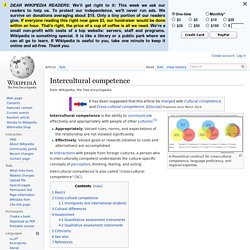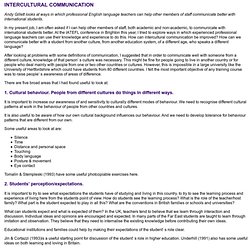

Reflections on language(s) and linguistics. Conflict Resolution and Peace Studies. Intercultural understanding. Journal of Intercultural Studies. ... to develop Intercultural Competence. Interculturality. Intercultural competence. A theoretical construct for cross-cultural competence, language proficiency, and regional expertise.

Intercultural competence is the ability to communicate effectively and appropriately with people of other cultures:[1] Appropriately. Valued rules, norms, and expectations of the relationship are not violated significantly.Effectively. Valued goals or rewards (relative to costs and alternatives) are accomplished. In interactions with people from foreign cultures, a person who is interculturally competent understands the culture-specific concepts of perception, thinking, feeling, and acting.
Intercultural competence is also called "cross-cultural competence" (3C). Basics[edit] Cultures can be different not only between continents or nations but also within the same company and even within the same family. The basic requirements for intercultural competence are empathy, an understanding of other people's behaviors and ways of thinking, and the ability to express one's own way of thinking. Themes / aspects / Elmar Holenstein: A Dozen Rules of Thumb for Avoiding Intercultural Misunderstandings.
Intercultural Education. Intercultural Communication Articles. For fresh articles and content visit our blog!

Below you will find access to a range of articles relating to cross cultural and intercultural communication. The articles touch upon a number of topics that will be of interest to a wide range of reader involved in intercultural communication such as international business personnel, HR staff, people working in public services and in many other areas where intercultural communication is an issue.
Intercultural Training Articles > An Introduction to Intercultural Communication - a basic summary of the purpose of intercultural communication. > Cross Cultural Communication Consultants - A look at the role, skills and qualifications of cross cultural communication consultants. > Definition of Intercultural Communication - what does intercultural communication mean? > Cross Cultural Understanding - an examination of common cross cultural terms and their meanings.
> Stereotypes: An Intercultural No-No - why stereotyping is dangerous. Intercultural communication. Andy Gillett looks at ways in which professional English language teachers can help other members of staff communicate better with international students.

In my present job, I am often asked if I can help other members of staff, both academic and non-academic, to communicate with international students better. At the IATEFL conference in Brighton this year, I tried to explore ways in which experienced professional language teachers can use their knowledge and experience to do this. How can intercultural communication be improved? How can we communicate better with a student from another culture, from another education system, of a different age, who speaks a different language? After looking at problems with some definitions of communication, I suggested that in order to communicate well with someone from a different culture, knowledge of that person’ s culture was necessary. There are five broad areas that I had found useful to look at: 1. Journal of Intercultural Communication. Intercultural Communication. Analyzing intercultural communication. Needs analysis.
One of the jobs I do fairly regularly is observe trainers in action, and one thing I've noticed time and time again is that although the class is having fun and appears to be happy with what the trainer is doing, no-one seems to be questioning whether or not the training is really going to help them in the real world.

Many learners seem to pass responsibility for what happens in the classroom to the trainer, who "knows best", and whose main job it seems is to keep everyone entertained, while at the same time organising activities which seem to be about "business English". Now there might be very good reasons for this. Perhaps this is actually all that the class wants to do. Perhaps the trainer is following a syllabus which has already been agreed with the course sponsors. But it may also be possible that the trainer simply doesn't know enough about what the learners really need to be able to do in English, and doesn't have the tools to find out. Tell us about your last meeting. Intercultural Stuff.
Intercultural.